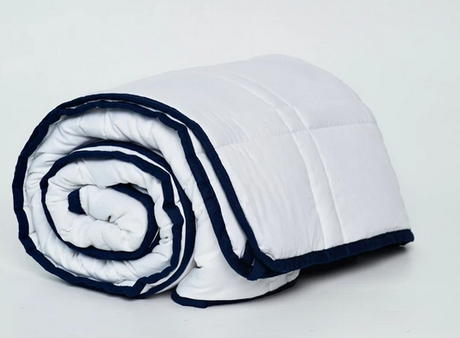Over the past few years weighted blankets have been popularised as a tool to generally improve sleep however it is unsettled with researchers whether they should be used by those who suffer from sleep apnea or other respiratory issues.
Weighted blankets are designed to weigh roughly 10% of your body weight and rely on the principle of Deep Touch Pressure. Deep Touch Pressure (DTP) is a tactile sensory input from any form of pressure exerted equally across the body, such as a hug, swaddle, or in this case, a weighted blanket. Receptors in your skin detect this grounding pressure and send a signal to your brain that you are in a stable safe environment. Your brain then releases serotonin & melatonin (feel-good relaxation neurotransmitters) while cortisol (stress & fight or flight hormone) is inhibited. The pressure may also stimulate oxytocin in many users. This calming effect eases tension in our mind and allows us to fall asleep and remain asleep.
Sleep Apnea (OSA) is a sleeping disorder that affects a large proportion of the population and results in those who are inflicted to have shallow & often noisy breathing throughout the night. This decreases the sleep quality of those with the condition as it often results in constant pauses during sleep as well as the disruption caused to those who sleep with a noisy snorer
When it comes to the question of whether weighted blankets will help those with sleep apnea, contrary to what you may think, being cocooned in an ultra heavy blanket may in fact cause your respiratory system to relax along with the rest of your body allowing you to breath and sleep much easier. This relaxation of your respiratory system may be explained by the increase in oxytocin that occurs when you use a weighted blanket. Researchers have shown the activation of oxytocin receptors have been shown to improve sleep apnea. For mild snorers this could be all that is needed to allow you to sleep silently without bothering your bed buddy with your noisy breathing.
However, when it comes to those with serious respiratory issues such as obstructive sleep apnea & asthmatics, researchers have been hesitate to recommend weighted blankets. The key concern of such researchers is that the weight of a weighted blanket will make it even more difficult for those with damaged lungs to breath, just as obesity makes it more difficult to manage respiratory issues. The extra weight on your anterior (front of your chest wall) may make your lungs work harder to expand and take air in.
At the end of the day; whether you should use a weighted blanket or not if you have sleep apnea or other respiratory issues will come down to a matter of personal preference as well as consultation with your General Practitioner. If you are concerned that a weighted blanket may impact your ability to breathe you should err on the side of caution and go with a lighter weight weighted blanket and gradually apply that weight over your body. Testing the weighted blanket while you are not sleeping may also give you an idea of whether or not it will impact on your breathing.







